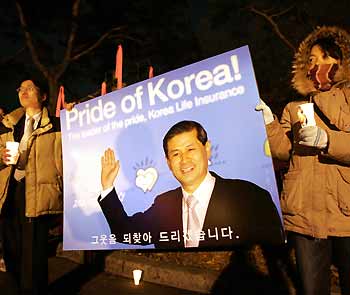|
Scientists faked two papers but cloned dog
(Reuters)
Updated: 2006-01-10 10:07
A team led by a once heralded and now disgraced South Korean scientist faked
two landmark papers on embryonic stem cells but did produce the world's first
cloned dog, an investigation panel said on Tuesday.
The panel at Seoul National University told reporters data was deliberately
fabricated in the papers produced by the team led by scientist Hwang Woo-suk.
Medical researchers say the episode -- which has shocked and shamed many
South Koreans who had dubbed Hwang a hero -- is one of the biggest cases of
scientific fraud in recent history.

South Korean supporters of compatriot
stem-cell scientist Hwang Woo-suk, participate in a candle light vigil in
front of Seoul National University in Seoul January 9, 2006.
[Reuters] | The two papers were a 2004 report on
producing the first cloned human embryos for research and the second was a 2005
paper on producing the first embryonic tailored stem cells.
"Hwang's team did not have the data for the stem cell lines in the 2004
paper, but fabricated it," Chung Myung-hee, the head of the panel, told
reporters.
The same panel said in an interim report in late December there was no data
to prove Hwang's team produced tailored stem cells, as it claimed in a May 2005
paper published in the U.S. periodical Science.
The panel said DNA analysis proved a 2005 claim made by the team of producing
the world's first cloned dog, an Afghan hound named Snuppy, which is short for
Seoul National University puppy.
The 2005 paper caused a sensation because the findings raised hopes that
embryonic stem cells could one day be used to create genetically specific tissue
to treat ailments such as severe spinal cord injuries and Parkinson's disease.
"We concluded that Professor Hwang's team did not have patient-specific stem
cell lines and did not have any scientific basis that the team made them," the
panel said.
Prosecutors have said they may start a criminal probe into Hwang on suspicion
of misusing state funds based on the findings in the panel's report.
Hwang has been in seclusion since he resigned from Seoul National University
on December 23. South Korean media said he may give a news conference on Tuesday
or Wednesday.
He has stood by his findings, saying they were South Korean technology and
would be proved.
The panel said the fraud in the May 2005 paper undermined the principles of
science and Hwang must shoulder much of the blame. The journal Science said it
would retract the paper.
Hwang has been accused by colleagues and junior researchers of deliberately
fabricating data. Female members of his team said Hwang coerced them to donate
their own eggs for research.
The discredited scientist had been widely feted by the government and admired
by the public before the scandal broke. Some people still vocally support
him.
|